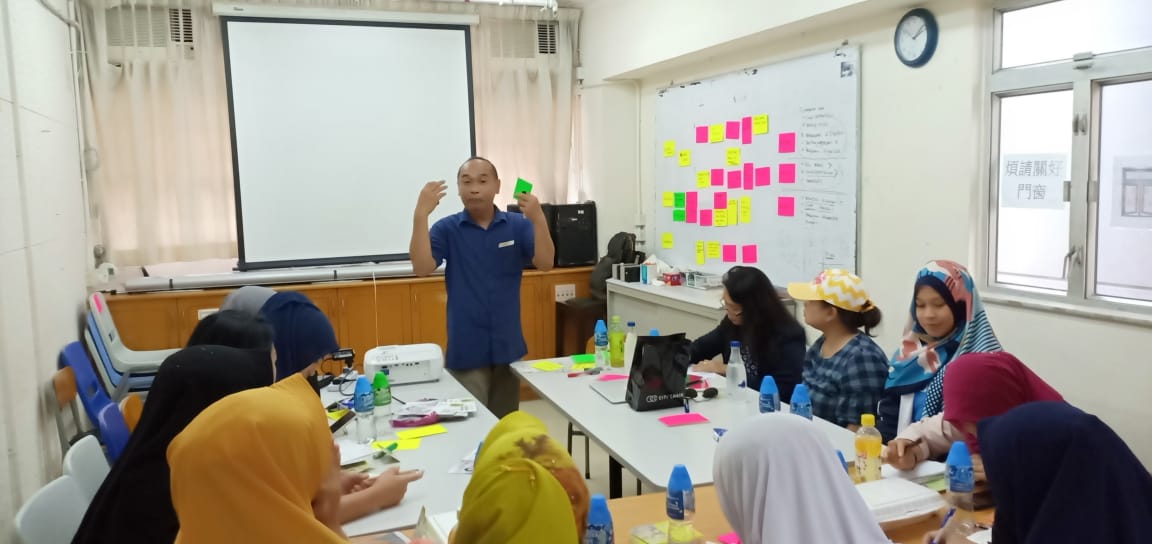
The Institute for Education, Development, Social, Religious and Cultural Studies (Infest Yogyakarta) strengthens the writing ability of female Indonesian migrant workers in Hong Kong through journalism training. The training was implemented on Sunday (29/09/2019) at the Hong Kong Confederation of Trade Unions to encourage individual migrant workers to maximise their writing abilities. Included in their writing was the anxiety they face from the occurrences in their surrounding environment.
Prevention of violent extremism in the migrant workers community is one of the important issues that is voiced by migrant workers.Especially, in the middle of a political crisis, Hong Kong has been coloured with vandalism and violence. According to Dedi Kristanto, Infest Program Officer in Hong Kong, this journalism training was designed to increase awareness regarding how violent extremism is being disseminated through social media. Furthermore, this training is also important for encouraging the building of a shared commitment from the Indonesian migrant worker community in Hong Kong to become involved in preventing violent extremism.
“The atmosphere in Hong Kong is very quiet, not like usual. However, there are several representatives from Indonesian migrant worker organisations that have been invited to attend the journalism training activities that have already begun arriving. Coincidentally, this activity coincided with other events, this was a challenge for Indonesian migrant worker that wanted to participate in this training,” said Dedi
Establishing the Working Group
Conditions in Hong Kong at the moment have certainly impacted Indonesian migrant worker activities in the community. Including news about large-scale protest actions would occur. According to Dedi, it was news that made several participants cancel their attendance at the journalism training activities. Others may have been prohibited from leaving the home or attending the activity by their employers. Nevertheless, the activity eventually went ahead and ran smoothly. At the training activity, participants also discussed the management structure of the working group.
Discussing the working group establishment was an introduction to the journalism training that was facilitated by the Director of Infest, Muhammad Irsyadul Ibad. Ibad conveyed material about “the role of social media in the spread of violent extremism”. The approach taken in this training was ‘adult education’, wherein each participant’s relevant personal experiences are explored in the learning process.
Recognising the Influence of Extremist Organisations on Social Media
At the beginning of the journalism training session, Ibad invited participants to look back on how social media influence has been used by extremist organisations. Social media is an effective tool for recruiting and influencing users to support their movement.
Dedi also explained that during the training process, participants were quite enthusiastic following the presentation about violent extremism and its relation to social media.
“During question and answer, it appeared that the discussion about channels through which exposure to violent extremism occurs made the material clearer to participants,” said Dedi
Although already clarified, added Dedi, it was implicit that the relationship between violent religious extremist movements and social media has not been fully grasped. But with several case studies, the relationship between extremist movements and the impacts of social media became more and more clear.
As the journalism training continued, a learning process was facilitated by Yudi Setiyadi from Infest Yogyakarta. This training was delivered in small groups and was an effective way of learning. Additionally, the material was delivered in an appropriate manner although this session was brief.
From the journalism training, participants gained a succinct understanding of information distortion. According to Dedi, although a very concise explanation, this section of the course provided a sufficient understanding to participants regarding the terrible impacts of information distortion. Participants were also invited to write their own news stories.
In one exemplary simulation, one person would act as a ‘source’ and the others attempted to produce a news story. The result was unexpected, as it turns out the participants had substantial journalistic writing skills.
